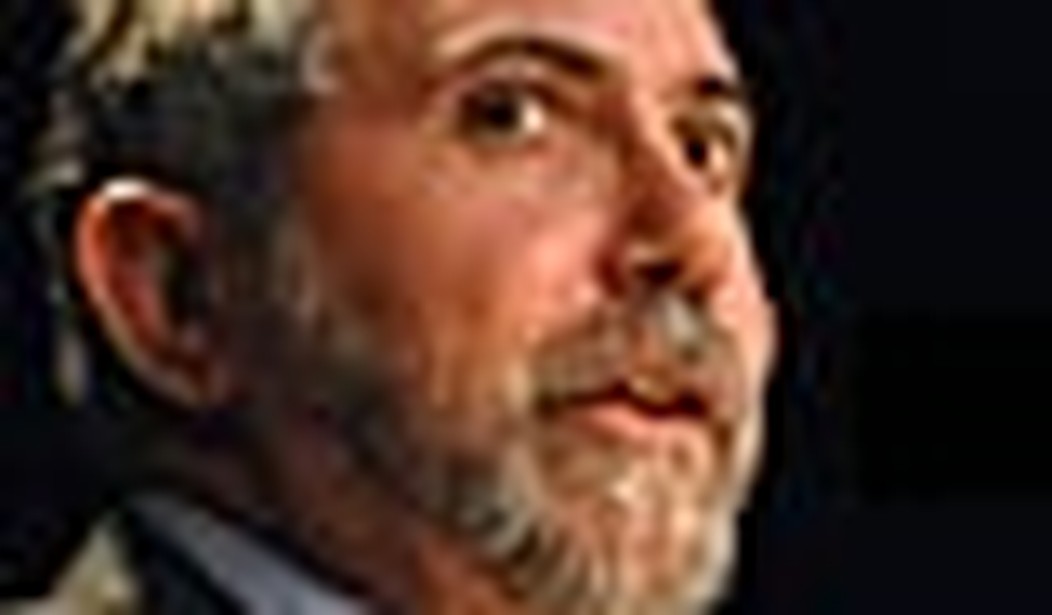The profile of New York Times columnist Paul Krugman that appears in the March 1 issue of the New Yorker is full of wonderment and adoration for its subject (his economics work is described as “poetry”). But it’s also revealing about the curious set of contradictions that animate this 21st century Howard Beale — Krugman is always mad as hell about something, perpetually vowing that he won’t take it any longer.
Hilariously, the piece begins by telling us all about how Krugman (who, as the old joke has it, predicted about fifteen of the last three crises) composes his legendarily venomous denunciations literally at the beach, in St. Croix where he and his former student (now wife) Robin Wells apparently spend a lot of time pushing each other’s buttons. Wells, the Lady MacBeth of the piece, is seen urging her husband to turn up the heat, to let his rage hit a roiling boil, as they watch the tide roll in and out. When these pina colada progressives aren’t strolling barefoot in the sand, they’re taking – I’m serious — yoga classes, which Wells teaches in their other home in Princeton. You have to wonder what kind of soothing, peaceful chants are overheard in the yoga room. I picture them sounding a bit like this:
Inhale, and imagine you’re a delicate little lotus, and .. GEORGE W. BUSH IS SATAN! and exhale. Good. Now for the Stabbing Mitch McConnell pose.
Winning the Nobel Prize in economics last year has greatly added to Krugman’s luster. The opinion aggregator reckons he is the no. 1 pundit in America (hence the world), and that ranking is hard to dispute now that Krugman’s ideological teammates are comfortably situated in the White House and in Congress. These lawmakers and executive branch potentates regularly phone Krugman.
Krugman may be your man when it comes to technical analysis of how economies of scale have affected international trade (the subject he won the Nobel for), but as a science, economics is still in the 14th century. In the profile, we learn that “the most successful paper Krugman ever wrote was about target zones [within which an exchange rate is allowed to float], and it was completely wrong.”
So the most famous economist in the world is somewhat of a flop as an economic “scientist,” if you can call him that when the most noted practitioners still debate basic questions about how well Keynesian New Deal policies worked — like befuddled astronomers discussing whether the Earth revolved around the sun or vice versa. His justification for his “target zones” fiasco is this: “If target zones worked the way that people say they’re supposed to work, then this is how it would play out.” Oh, okay. So in some alterna-reality, he’s right. Would doctors be rewarded for publishing papers about how to treat cancer patients as if health were a matter of balancing the bodily humors of blood, yellow bile, black bile, and phlegm?
In his Times column, Krugman writes mostly as a political scientist, not an economist. So he isn’t even working in his field of expertise. But surely his rigorous intellectual methods, his “pellucid clarity” (in the words of Lawrence Summers, the director of the National Economic Council who frequently speaks to Krugman) make him the “rock star” he is?
Not really. The New Yorker profile makes it clear how little of the scientific method Krugman brings to his column. Is he (unlike a scientist, but like any other excitable partisan hack) susceptible to hysterical exaggeration? Yes. (He accused President George W. Bush of “trying to bankrupt Social Security.” Sure. That was Bush’s goal.)
Does he have a scientist’s even, disinterested temperament? No. (At a 2008 election night party Krugman and his wife hosted, guests were encouraged to burn effigies — presumably George W. Bush was the favorite kind, although the article doesn’t go into detail.)
Is he outside the mainstream? Proudly. (The 2000 election “radicalized” him, says the New Yorker writer).
Does he dump his principles when party-line support renders them inconvenient? Of course. Krugman derided President Bush for running deficits. “Even the most sober observers now talk starkly about the risk to our solvency,” Krugman wrote in 2003. He added, “It’s impolite to say that George W. Bush is the most fiscally irresponsible president in American history, but it would be dishonest to pretend otherwise.” Today, Krugman thinks President Obama is far too fiscally disciplined and should have pushed for a much bigger stimulus, even as Obama runs up deficits much larger than Bush’s and undreamed of since World War II. And Krugman loved the filibuster when Democrats used it, saying only “extremists” wanted to rid the Senate of this scourge, which was being used to block judicial appointments. Today, with Republicans wielding the filibuster threat to stop a massive health-care bill that is much more of a game-changer than any federal judiciary appointment, Krugman says to “blame the filibuster, under which 41 senators can make the country ungovernable.”
The most memorable sentence among many in the New Yorker profile may be this one: “Krugman explained that he’d become an economist because of science fiction.” Krugman is a sci-fi creature, a two-headed Godzilla roaring out of both sides of his mouth, and his value to fans isn’t from any cogent, consistent argument, any scientific inquiry, any reasoned insight. They simply love to watch fire come out of his mouth.









Join the conversation as a VIP Member